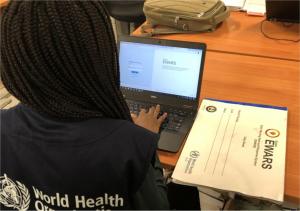EWARS- improving early detection and prompt response to acute public health events
Maiduguri, 1 November, 2019 - Not so long ago, collecting and evaluating large amounts of data in the field on disease trends and patterns – an activity known as surveillance – was a cumbersome process. Surveillance officers noted information by hand on paper and sent hard copies of weekly reports to the local government area (LGA) secretariat via disease surveillance and notification officers (DSNOs).
“This made emergency response a bit slow,” says Mr Abubakar Wuyo, a surveillance officer at State Specialist Hospital Maiduguri in Borno State.
Now, however, surveillance officers in North-east Nigeria are increasingly using the World Health Organization’s Early Warning Alert and Response System (EWARS), which allows them to collect and send data electronically.
“We are now able to send our reports directly to the LGAs and this has greatly improved surveillance and response activities,” Mr Wuyo adds.
EWARS was launched in Nigeria in August 2016 in Borno State and forms part of the country’s Integrated Disease Surveillance and Response (IDSR) framework. EWARS is particularly useful in improving disease outbreak detection in emergency settings, such as in areas where there is conflict.
When EWARS was first rolled out, it covered 56 health facilities and 16 IDP camps in five LGAs: Maiduguri, Jere, Konduga, Mafa and Kaga. Presently, there are 278 reporting sites, including in 32 IDP camps, across 23 LGAs. Approximately 1.48 million IDPs are covered, up from the 1.2 million IDPs planned for in 2016. So far, EWARS has been able to detect early outbreaks of measles in select LGAs from 2016 to 2019. A noteworthy detection is the largest Measles outbreak across Borno State in 2019; over 20,000 cases and 62 deaths were detected and monitored through the system. EWARS was also able to detect a Hepatitis E virus (HEV) outbreak in 2017 which was identified initially as a suspected Yellow fever outbreak, but upon investigation, it was found to be HEV. In addition, the 2018 Cholera outbreak (which reported 6367 cases with 73 deaths; CFR: 1.1%) in 13 LGAs was detected through the system.
Every reporting site has a surveillance officer, the main focal point who reports data weekly via a mobile phone. WHO conducts annual EWARS training for health workers at all new and existing reporting sites. In addition, WHO provides supportive supervision at reporting sites in conjunction with the Borno State Ministry of Health (BSMoH). Disease alerts are triggered in real time based on alert thresholds for the health events under surveillance from submitted reports.
“EWARS has greatly improved the reporting system in the state,” says Dr Babagana Abiso, Director of Disease Control at the Borno State Primary Health Care Development Agency (BSPHCDA) at the State Ministry of Health (BSMOH). “It makes surveillance easier and faster. We receive alerts early which enable us to detect in good time any increase in the number of cases of any given disease – and to respond appropriately to prevent further spreading.”
Improving disease outbreak detection in emergency settings
Since 2016, WHO and the Borno State Ministry of Health have trained 580 local health workers to use the system to improve disease outbreak detection in emergency settings.
At present, EWARS is used to monitor 17 diseases: acute flaccid paralysis (AFP), meningitis, cholera, viral hemorrhagic fever, measles, yellow fever, Guinea worm, Human influenza (caused by new subtype), Malaria (suspected), Malaria (confirmed), acute respiratory infections, acute watery diarrhea, bloody diarrhoea, malnutrition, mental health illnesses, and maternal and neonatal deaths.
“Prior to EWARS, surveillance reporting was often interrupted because of insecurity and this resulted in under reporting,” says Amaka Onyiah, a WHO data manager in the Health Information Management and Risk Assessment unit. “The impact of EWARS can be measured by the number of suspected disease outbreaks that have been detected early through the system and responded to.”
EWARS helped surveillance officers detect measles outbreaks in 2016, 2017, and 2018 in various LGAs across Borno State. Early detection resulted in prompt investigation and sample collection to confirm the outbreak and subsequent response activities to get it under control. EWARS also played a key role in the early detection of cholera and hepatitis E outbreaks.
Funding for EWARS is provided by the European Civil Protection and Humanitarian Aid Operations (ECHO), the Office of US Foreign Disaster Assistance (OFDA) and the Government of Germany.
Technical Contacts:
Dr Ifeanyi Okudo; Tel: +2348034020833; Email: okudoi [at] who.int (okudoi[at]who[dot]int)



